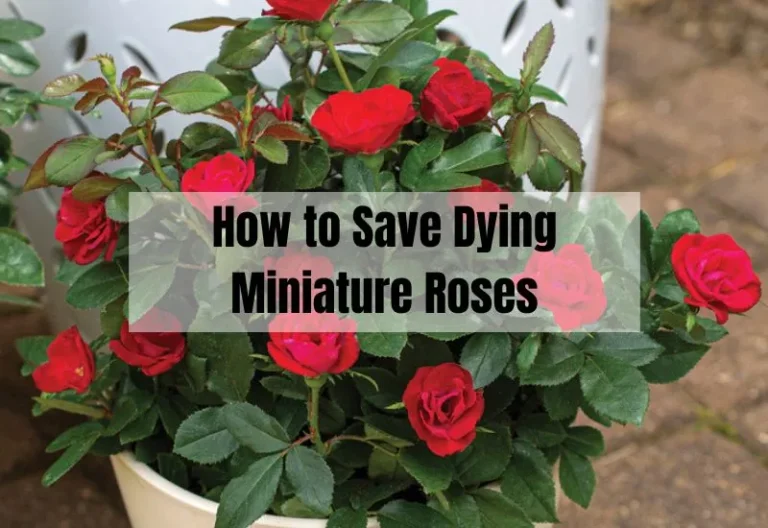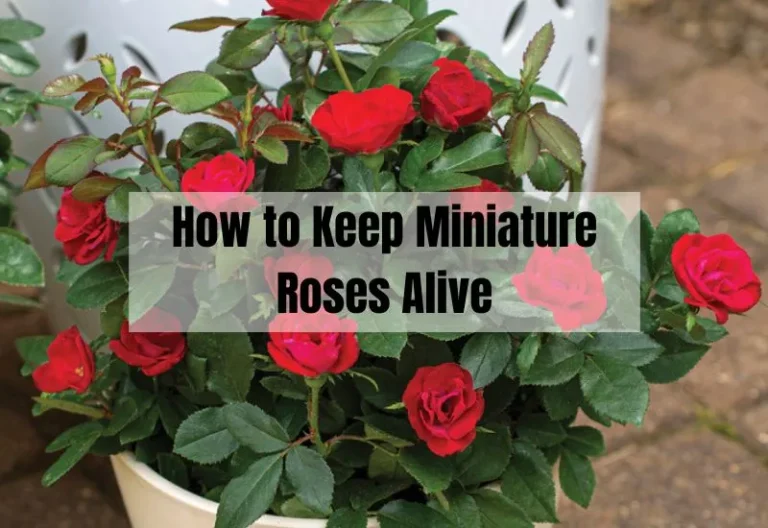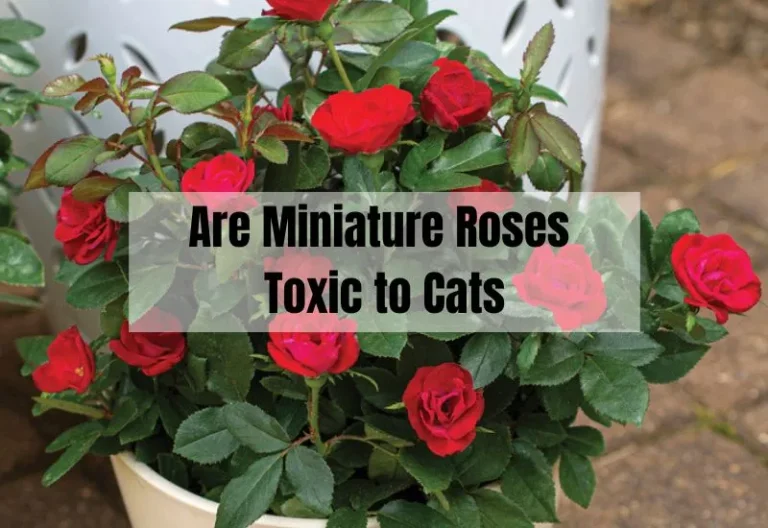Are Roses Toxic to Cats? What You Need to Know
Are you a cat owner who loves to decorate your home with beautiful flowers? Do you have roses in your garden or on your kitchen table? If so, you may be wondering Are Roses Toxic to Cats? The good news is that roses are generally safe for cats. but it’s essential to know the facts to keep your feline friend safe.
While roses are not considered toxic to cats, they can still cause gastrointestinal upset if ingested. The petals and leaves of roses are non-toxic, but the thorns can cause injury to your cat’s mouth and digestive tract. It’s crucial to keep your cat away from roses to prevent any potential harm.
In this article, we’ll dive deeper into the topic of roses and cats and provide tips on how to keep your cat safe around flowers.
Key Takeaways
- Roses are generally safe for cats, but it’s important to keep them out of reach to prevent any potential harm.
- The thorns of roses can cause injury to your cat’s mouth and digestive tract, so it’s important to be cautious.
- Consider using alternative cat-friendly plants for decoration to keep your cat safe and healthy.
Are Roses Toxic to Cats?

If you’re a cat owner and a lover of roses, you might be wondering if your favorite flower is safe to have around your furry friend. The good news is that roses are generally safe for cats to be around. However, there are still some things to keep in mind.
Eating Roses
While roses are not toxic to cats, eating them can still cause some issues. If your cat ingests too many rose petals or leaves, they may experience gastrointestinal upset such as vomiting, anorexia, or diarrhea. So, it’s best to keep your cat away from eating roses.
Rose Thorns
One thing to keep in mind when it comes to roses and cats is the thorns. If your cat gets too close to the roses, they may get pricked by the thorns, which can cause injury.
It’s best to keep your cat away from the roses or to remove the thorns before bringing them inside.
Other Rose Products
While fresh roses are generally safe for cats, other rose products may not be. For example, essential oils made from roses can be toxic to cats if ingested or applied topically.
So, if you use rose essential oils in your home, make sure to keep them out of reach of your cat.
What Parts of Roses Are Harmful?
While roses are generally considered safe for cats, there are some parts of the plant that can be harmful if ingested. The thorns on the stem can cause injury to your cat’s mouth or digestive tract if swallowed.
Additionally, the leaves and stems of the plant can cause stomach upset or irritation if consumed in large quantities. It is also important to note that some types of roses may have been treated with pesticides or other chemicals that could be harmful if ingested.
If you are growing roses in your garden, be sure to research the specific type of rose and any treatments that have been used before allowing your cat to come into contact with the plant.
What Are the Symptoms of Rose Poisoning?
If you’re a cat owner who loves to decorate your home with beautiful flowers, you may be wondering if roses are safe for your feline friend. While roses are generally non-toxic to cats, it’s important to understand the potential effects of rose ingestion in cats.
Upset Stomach
Ingesting roses can cause an upset stomach in cats. The petals and leaves of the rose plant are not toxic, but they can be difficult for your cat’s digestive system to process.
Eating a large amount of roses can cause vomiting and diarrhea in your cat, which can lead to dehydration and other health problems.
Thorns
While the petals and leaves of the rose plant are not toxic, the thorns can be dangerous for your cat. If your cat tries to play with or eat the rose plant, they may accidentally ingest a thorn, which can cause injury to their mouth and throat.
Additionally, if a thorn becomes lodged in your cat’s digestive system, it can cause blockages and other serious health issues.
Allergic Reactions
Some cats may be allergic to roses, just like humans can be allergic to certain plants. If your cat has an allergic reaction to a rose plant, they may experience symptoms such as itching, swelling, and difficulty breathing.
If you notice any of these symptoms in your cat after they have come into contact with a rose plant, you should seek veterinary care immediately.
What to Do If Your Cat Ingests Roses?
If you suspect that your cat has ingested a harmful amount of roses, it is crucial to contact your veterinarian immediately. Your vet may recommend inducing vomiting or providing supportive care to help your cat recover.
In the meantime, you can help prevent further ingestion by removing any remaining rose petals, leaves, or stems from your cat’s environment. Keep a close eye on your cat for any signs of distress, and provide plenty of fresh water to help flush any toxins from their system.
Remember, while roses are generally considered non-toxic to cats, it is still essential to be aware of the potential risks associated with ingestion. By taking steps to prevent your cat from coming into contact with harmful parts of the plant, you can help keep them safe and healthy.
Preventing Cats from Chewing on Roses
Cats are known for their curious nature and love of chewing on plants, including roses. However, this can be harmful to both the plant and your cat. Here are some tips to prevent your cat from chewing on roses:
- Keep your roses out of reach: The easiest way to prevent your cat from chewing on your roses is to keep them out of reach. You can do this by placing them on high shelves or hanging them from the ceiling. If you have outdoor roses, consider putting a fence around them to keep your cat away.
- Use deterrents: There are several natural deterrents that you can use to keep your cat away from your roses. These include citrus peels, coffee grounds, and vinegar. Simply place these items around your roses, and your cat will likely stay away.
- Train your cat: Training your cat not to chew on your roses is another effective way to prevent them from doing so. You can do this by using positive reinforcement. Whenever your cat stays away from your roses, give them a treat or praise them. This will help them associate good behavior with rewards.
- Provide alternatives: Cats love to chew on things, so it’s important to provide them with safe alternatives. You can give them cat grass or catnip to chew on instead of your roses. This will satisfy their chewing needs and keep them away from your plants.
By following these tips, you can keep your roses safe and your cat happy. Remember, prevention is key when it comes to keeping your cat from chewing on your plants.
Professional Tips for Cat Owners
As a responsible cat owner, you want to ensure that your furry friend is safe and healthy at all times. While roses are not toxic to cats, their thorns can be dangerous, so it’s important to keep them out of reach. If you have outdoor roses, make sure to keep your cat away from them as well.
When buying store-bought roses, be cautious as the pesticides and preservatives used on them can be poisonous to cats. It’s best to wash the roses thoroughly before bringing them into your home.
If your cat has ingested any part of a rose or has been exposed to pesticides, watch for signs of toxicity such as vomiting, diarrhea, lethargy, and difficulty breathing. If you notice any of these symptoms, contact your veterinarian immediately.
Consider cat-friendly alternatives such as snapdragons, sunflowers, and wax flowers. These flowers can add color and beauty to your home without posing a threat to your cat’s health.
By following these professional tips, you can ensure that your cat stays safe around roses and other potentially harmful plants. Remember, prevention is always better than cure.
Frequently Asked Questions (FAQs)
What flowers are poisonous to cats?
There are several flowers that are poisonous to cats, including lilies, tulips, daffodils, and azaleas. It’s important to keep these flowers out of reach of your feline friends to avoid any potential health problems.
Are lilies toxic to cats?
Yes, lilies are extremely toxic to cats. Even a small amount of lily pollen or petals can cause kidney failure in cats. If you suspect your cat has come into contact with lilies, seek veterinary care immediately.
Are chrysanthemums toxic to cats?
Yes, chrysanthemums are toxic to cats. They contain pyrethrins, which can cause vomiting, diarrhea, and even seizures in cats. Keep these flowers away from your furry friends.
What is the most toxic flower to cats?
Lilies are considered the most toxic flower to cats. As mentioned before, even a small amount of lily pollen or petals can cause kidney failure in cats.
What happens if my cat eats my roses?
Roses themselves are not toxic to cats, but the thorns on the stems can cause injury. If your cat eats a rose, they may experience some gastrointestinal upset, such as vomiting or diarrhea. Keep an eye on your cat and contact your veterinarian if they show any signs of illness.
Are Knockout roses toxic to cats?
Knockout roses are not toxic to cats. However, as with any flower or plant, it’s important to keep them out of reach of your cat to avoid any potential injury or ingestion.
Remember to always keep an eye on your cat and monitor their behavior around flowers and plants. If you suspect your cat has ingested something toxic, seek veterinary care immediately.
Conclusion
In summary, roses are not toxic to cats. However, it is still important to take precautions to ensure your feline friend’s safety. Keep roses and other non-toxic plants out of reach, as cats may still experience an upset stomach if they overindulge. Additionally, be aware of potential hazards such as flower food and vases.
If your cat enjoys nibbling on plants, stick to safe options such as spider plants, Boston ferns, and African violets. Before introducing any new plant to your home, always research whether it is safe for your cat or consult with a veterinarian.
At the end of the day, your cat’s health and wellbeing should be a top priority. By taking the necessary precautions and being informed about potential hazards, you can ensure that your feline friend stays happy and healthy for years to come.
Related Posts:






